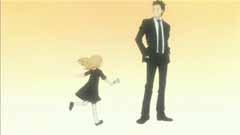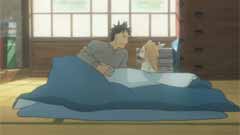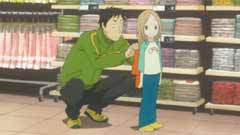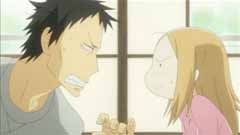

 |
 |
||||
| Home | Reviews | Extras | Forums |
|
Bunny DropSynopsisUpon arriving at his grandfather's funeral, Kawachi Daikichi finds himself face to face with a six year old girl he had never seen before. His mother tells him that the girl is named Rin, and is apparently his grandfather's illegitimate child. As the funeral ceremony proceeds, Daikichi notices that Rin is largely ignored by the rest of the family, and when they try to get her into a childcare center instead of taking on the responsibility themselves, he loses his temper with them all and takes her in himself. ReviewIt isn't often you see the topic of childcare come up in anime... or in any shows or movies at all. Most of the time, we are introduced into families already established a long time ago. The few examples that immediately comes to mind: Ghibli movies, My Neighbor Totoro in particular, seem to have a pretty clear idea how children behave, as does Ponyo to an extent. In the realm of manga, Yotsuba&! introduced me to a delightful little girl who faces everything head-on with all the energy she can muster, and in that manga, we literally see things through her eyes.  In that regard, Bunny Drop is a bit different, as it places the viewpoint squarely on Daikichi's shoulders -- or, to be more specific; through Daikichi's eyes. But the focus of the show is nevertheless Rin Kaga, the girl he literally took in on a rage-induced whim. Part of the charm of Bunny Drop is seeing just how out of his depth Daikichi is. The show makes no secret in that his spontaneous "adoption" of the six year old girl was a rash decision, even if he probably had the whole audience cheering for him when he told his family what for. Nevertheless, from their first, really awkward breakfast the morning after, Daikichi and Rin sets out to build a life together. Another reason why this works is because Daikichi, for all his initial bluster, is an actual adult. He might've made an unplanned decision in taking her in, but he deals with his situation like an adult: he weighs his options and chooses what will work out the best for both of them. Rin, for her part, is one of the best depictions of children I've seen in anime. She looks like a child. She dresses like a child, and she enters Daikichi's life with a childish uncertainty and a head full of questions. But once she opens up to Daikichi, she's got a clear idea of what she wants and when. Idealized viewpoint notwithstanding -- Rin is a remarkably easy child to care for, mostly quiet and great at entertaining herself once she's settled -- what makes this show so much fun to watch is to see Daikichi's reaction to everything. At his own admission, he's not very good with women or children, and Rin is basically both. Furthermore, he has a naturally intimidating face which normally tend to keep children at arm's length, but it is ultimately his resemblance to his grandfather that initially draws Rin to him. And so, he finds himself panicking over every little thing: finding Rin new clothes. Finding out what she likes. Finding her a daycare. Making sure she eats right. Watching over her with a sense of dread as she experiences her first serious fever. In many ways, Daikichi's life has also turned into a long sequence of discoveries as he races to keep up with the adjustments he has to make to fit Rin into his life. Her unwavering trust in him coupled with his eventual refusal to give her up to anyone else in turn creates a bond as palpable as it is adorable.    For the viewer, the (possible) transition from manga to anime is going to be an easy one. Bunny Drop is made to look like the manga in every respect, and it works -- unsurprisingly -- quite well. The show has made a rather artistic choice in having the pre-opening scenes look like watercolor paintings, which makes it look both similar and different compared to the main episodes themselves. The opener is a quite catchy little pop number by Puffy, which suits the show to a tee at all times, except for the first episode, where it feels rather out of place due to said episode being about the funeral service throughout most of its runtime. The animation is hardly impressive, but it doesn't really need to be, seeing as Bunny Drop is a generally quiet show. I'm aware that there are bonus episodes meant for DVD/Bluray release, but to see the first four volumes covered in a mere eleven episodes is still astounding in itself. The manga hardly had much in the way of excess fat, so to see the exact opposite of needless filler is a little bit disappointing. Nevertheless, all of the most important key moments from the manga is there, so the anime is definitely a worthy successor. This does mean that any continuation of this is going to take place after the timeskip in the manga going from volume four to volume five, and I'm a bit uncertain how people are going to feel about that. Especially since the manga starts seeing things from Rin's eyes instead of Daikichis. Those are the deal breakers for any future seasons of this show.    The manga readers among you might also be bothered by the omission of much of Daikichi's inner monologue. In the manga, much of what he states are less meant for his surrounding enviroment, yet they're a part of what constitutes his character. The oddest change can actually be found in the first episode, where, instead of lecturing his relatives about their misconceptions regarding Rin's personality, he just walks up to the table, slams down his mug and then immediately turns to Rin. (Though the relatives' reactions are still as they were.) It also follows the manga in leaving itself open for further seasons, but the show can hardly be blamed for that; it merely follows the manga's ending to Rin's childhood to the letter, adding a short sequence past the end credits to at least try to give it some feeling of closure before hopefully moving on to the next stage. What this all doesn't change, though, is that Bunny Drop is an incredibly charming, fun and cute little show that can easily be taken on its own. And seeing as the show is now released on a DVD/Bluray combo -- including the four shorts made after the main show -- you should definitely prepare some space in your shelf for this quiet, understated gem. That Bunny Drop was going to be great was no surprise. I knew it the moment I read the announcement. — Stig Høgset Recommended Audience: The only thing even remotely objectionable in this show would be when Daikichi takes Rin to a party arranged by his fellow workers, where alcohol is consumed (in moderate amounts.) Version(s) Viewed: Crunchyroll stream, sub only. Review Status: Full (11/11) Bunny Drop © 2011 Yumi Unita / Shodensha / Usagi Drop Committee |
 |
|
| © 1996-2015 THEM Anime Reviews. All rights reserved. |